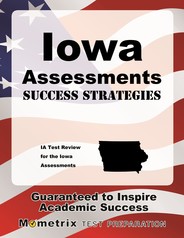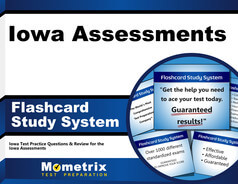The Iowa Assessments, offered by the Houghton Mifflin Harcourt-Riverside Publishing Company, are a series of tests used with kindergarten through grade twelve students to determine college and career readiness.
These tests can be used to determine readiness in an individual student of groups of students within a particular school or district. The Iowa Assessments test results are used to measure many areas of student growth in local, state, and national performance benchmarks. These assessments are used to support school achievement reporting requirements; they are a predictor of future assessment results, help to create intervention plans and placement decisions, and may be used to evaluate a student’s mastery of Common Core State Standards.
All of this data, collected, compiled, and reviewed from the Iowa Assessments is useful in measuring current and future performance. Schools nationwide are now required to provide more concrete, reliable data on student performance from kindergarten through grade twelve. The Iowa Assessments are a good way to measure achievement incrementally over a period of time.
Another major feature of these assessments is the ability to customize a curriculum for a student or group of students based on their current knowledge and skills. A customized curriculum is designed taking into consideration a students’ exact strengths and weaknesses and creates a program to improve their skills and monitor their progress for college plans and prospective careers.
At this time, there are thirteen different assessments that an individual, school, or district can take advantage of; there are listening assessments, language, science, social studies, reading, word analysis, written expression, math, capitalization, spelling, vocabulary, punctuation, and computation.
These assessments are organized by levels, where levels 5 and 6 are for grades kindergarten through one, level 7 is grades one and two, level 8 is grades two and three, levels 9 through 14 are grades three through eight, and levels 15 through 17 and 18 are grades nine through twelve. Depending upon the level and test, time allotment for assessments many vary as well as number of questions.
Additionally, the components in each level may vary; for instance, at level 5 and 6, there are six categories for testing (vocabulary, word analysis, listening, language, math, and reading) totaling 187 items with an approximate time of completion being two hours and forty minutes. Comparatively, at a level 7, there may be nine testing categories (add in science, social studies, and computation) with 278 total questions and a little over four hours to complete.
The Iowa Assessments program is backed by respected educators in the field who provide feedback to the tests. The assessments are instructionally sound and are provided in varying modes of delivery, from traditional paper-based testing to online administration. The assessments are recognized for their expanded offerings and ease of score interpretation, which make it easy for educators to read and use.
There are three types of packages an administration may use; one is called basic data, another is called data plus, and then there is the platinum data package. The basic differences in price packages are how the test is administrated (paper-and-pencil testing versus online mode and score testing conducted by a testing center versus hand scoring). Web-based reporting or paper-based options are to be considered as well.
Self-Assessment Modules
- Basic Algebra
- Intermediate Algebra
- Advanced Algebra
- Averages and Rounding
- Arithmetic
- Commas
- Estimation and Sequences
- Exponents
- Fractions and Square Roots
- Geometry
- Graphs
- Basic Math
- Intermediate Math
- Advanced Mathematics
- Measurement
- Nouns
- Percents and Ratios
- Author's Purpose
- Reading for the Main Idea
- Basic Reading Comprehension
- Intermediate Reading Comprehension
- Advanced Reading Comprehension
- Reading Vocabulary
- Sentence Correction
- Sentence Flow
- Word Usage Test 1
- Word Usage Test 2
- Word Usage Test 3
- Verbs
- Writing Section 1
- Writing Section 2




